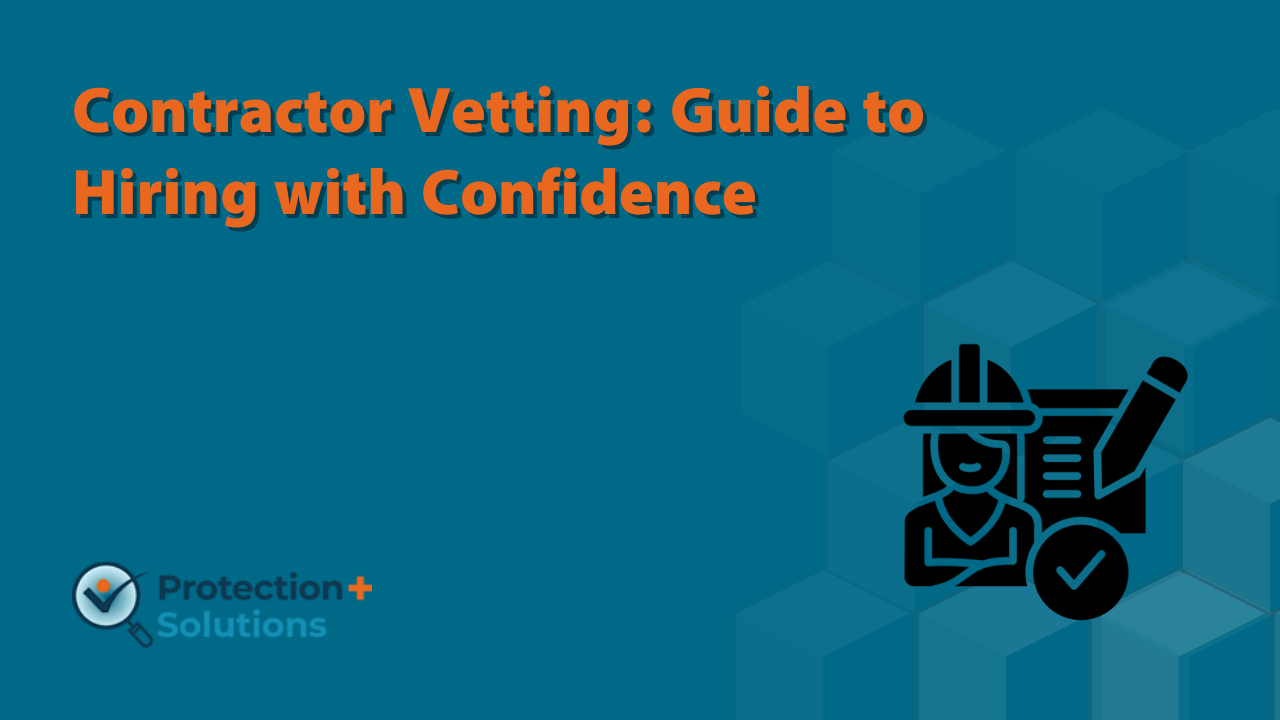Contractor Vetting: Guide to Hiring with Confidence

Hiring a contractor isn’t just about finding someone with the right tools. It’s about trust. Whether it’s for construction, IT services, or specialized trade work, contractor vetting helps you separate the professionals from the pretenders. Think of it like checking under the hood before buying a used car you want to be sure you’re not walking into a costly mistake.
Why Contractor Vetting Matters
Legal Compliance
Regulations vary across industries, but one thing is certain: hiring an unlicensed contractor can land you in legal hot water. Proper vetting ensures compliance with labor laws and industry standards.
Safety and Quality Assurance
Cutting corners with vetting often leads to shoddy workmanship and even safety hazards. A vetted contractor is far more likely to meet quality standards and follow safety protocols.
Common Risks of Hiring Unvetted Contractors
Financial Risks
An unqualified contractor may underbid and then rack up hidden costs. Worse, you may have to pay again to fix their mistakes.
Liability Concerns
Without proper insurance, you might end up liable for accidents or damages that occur on your property.
Reputation Damage
If you’re a business hiring contractors, one mistake can hurt your brand. Bad reviews spread faster than good ones.
Steps in Contractor Vetting
Defining Your Project Needs
Start by being clear on scope. Are you hiring for a one-time project or ongoing work? Clear project needs help filter out unsuitable contractors.
Researching Potential Contractors
Look beyond Google ads. Check trade associations, referrals, and verified platforms.
Verifying Credentials
Never take a contractor’s word at face value. Always verify licenses, permits, and certifications directly with issuing authorities.
Checking Contractor Licenses and Certifications
Industry-Specific Licenses
Different jobs demand different credentials. For example, electricians need state licensing, while IT contractors may require cybersecurity certifications.
Trade Certifications
Extra certifications often show commitment to professionalism and continuing education.
Evaluating Contractor Experience and Portfolio
Reviewing Past Projects
A strong portfolio can reveal both the contractor’s expertise and their style.
Asking for Client References
Don’t skip this step. Reach out to past clients to confirm reliability and quality.
Understanding Insurance Requirements
Workers’ Compensation
Covers injuries to workers while on the job.
General Liability Insurance
Protects against damages caused to property or third parties.
Interviewing Contractors Effectively
Key Questions to Ask
- What similar projects have you handled?
- How do you handle delays or disputes?
Red Flags to Watch Out For
Evasive answers, reluctance to provide documentation, or pushing for large upfront payments.
Comparing Bids and Quotes
Avoiding the Cheapest Trap
Low bids often mask hidden costs or poor quality.
Ensuring Transparency in Pricing
Look for detailed breakdowns instead of lump-sum estimates.
Assessing Communication and Professionalism
Responsiveness
Do they reply promptly? Communication is often a window into their reliability.
Clarity and Transparency
A professional explains terms in plain English, not jargon.
Legal Contracts and Agreements
Essential Clauses to Include
Timelines, deliverables, dispute resolution, and warranties should all be in writing.
Payment Terms and Timelines
Never agree to full payment upfront. Milestone based payments reduce risks.
Monitoring and Ongoing Evaluation
Regular Check-Ins
Frequent updates keep projects on track.
Quality Control Measures
Don’t wait until the end to inspect work. Review as the project progresses.
Technology in Contractor Vetting
Digital Vetting Platforms
Sites like Angie’s List, Houzz, or specialized B2B vetting platforms provide verified reviews.
Online Reviews and Ratings
While helpful, reviews should be balanced with direct checks.
Global and Remote Contractor Vetting
International Hiring Challenges
Different countries have different labor laws and standards.
Compliance with Global Standards
For remote work, ensure contractors adhere to data security, GDPR, or ISO standards where applicable.
Conclusion
Contractor vetting isn’t just about ticking boxes it’s about protecting your investment, ensuring quality, and keeping peace of mind. With proper vetting, you avoid legal headaches, reduce risks, and foster long-term professional relationships built on trust.

